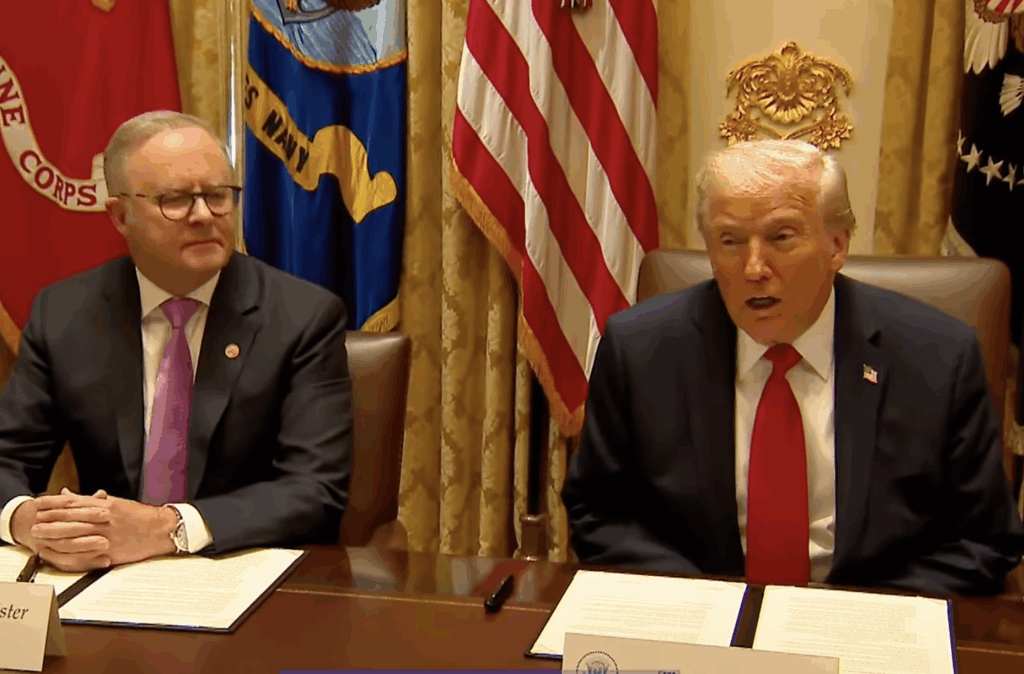Prime Minister Anthony Albanese is a “great leader”, according to US President Donald Trump.
But Australian Ambassador Kevin Rudd? “I don’t like you,” the president said across the table.
The comments came as Albanese finally sat down with Trump for their first bilateral meeting earlier this morning, alongside their broader teams.
There were deals done in the meeting of men (and it was almost all men at the table), including a US$8.5 billion critical minerals deal. More on that in a moment.
And there were endorsements made, including that regarding the $368 billion AUKUS pact for Australia to acquire US nuclear-powered submarines.
And there was plenty of talk of war, battlefields and friendships forged in the trenches.
“We’re here to talk about trade, submarines, lots of other military equipment,” Trump declared as the meeting started.
“We’re really working on anything to do with military, military protection, ships, vehicles, guns, ammunition, the whole thing.”
The meeting has largely been seen as a win for Albanese, possibly because he didn’t get humiliated on the White House stage, like others before him.
But what about the substance of what was actually agreed between Albanese and Trump?
Australia walks away with continued low tariffs. So that’s something.
From there, the price that current and future generations of Australians will pay is astronomical.
Australia is still committed to an eye-wateringly expensive AUKUS deal with a volatile partner, a defence pact requiring ongoing billions in funding and a workforce we don’t have, for a small number of submarines delivered over decades.
And now Australia has a new agreement to work with the US on: accelerating the mining and processing of critical minerals and rare earths.
The deal will see the two countries working together on mobilising government and private sector through guarantees, loans, insurance and regulatory facilitation, among other things.
It’s big, opportunity-building stuff.
Again, at what cost?
The limited fine print of the deal appears to commit us to sidestepping environmental laws and regulations to get mining.
Under the term “permitting”, the deal notes that “The participants are taking measures to accelerate, streamline, or deregulate permitting timelines and processes, including to obtain permits for critical minerals and rare earths mining. Separation. And processing within their respective domestic regulatory systems, consistent with applicable law.”
Another line in the agreement notes that, “The U.S. Department of War will invest in the construction of a 100 metric ton-per-year advanced gallium refinery in Western Australia, further advancing self-reliance in critical minerals processing.”
Albanese announced a $US200 million ($307 million) investment into the Gallium Recovery Project in Wagerup, WA, following his press conference with Trump.
Albanese says Australia and the US will both contribute at least $1 billion each to moving the process along, over the next six months. The White House statement shares figure of $US3 billion ($4.61 billion) to be spent between the two countries, while declaring “recoverable resources in the projects estimated to be worth $53 billion.”
Rare earth materials are necessary for producing everything from phones to weapons, as well as for the production of green energy. They are essential for manufacturing advanced technologies, including AI and electric vehicles.
And Australia happens to boast some of the world’s richest deposits of such minerals, while China accounts for around 70 per cent of global mining and 90 per cent of global processing — something that the US, now with Australia’s help, is looking to disrupt.
As Trump declared, “In about a year from now, we’ll have so much critical minerals and rare earths that you won’t know what to do with them.”
And as Albanese declared, “Australia is home to much of the periodic table of critical minerals and rare earth metals that are vital for defence and other advanced technologies.”
While critical minerals are necessary for green technologies, extracting and processing them has environmental costs, including in terms of emissions and water.
Meanwhile, the White House fact sheet declares that Australia’s superannuation funds “will increase investments in the United States to $1.44 trillion by 2035 — an increase of almost $1 trillion from current levels.”
Much will be made of Trump’s comments to Kevin Rudd during today’s meeting, so much so that it may overlook the finer points of what was agreed. The prime mininster’s success of getting through the meeting personally unscathed will also overlook his partaking in the now “normalised” approach of world leaders doing everything possible to appease a president like Trump.
In Albanese’s case, the appeasement also included a suggestion that Trump come to Australia for the Presidents Cup to be held in Melbourne. We have some time. The golf tournament is not for another three years, in 2028.


